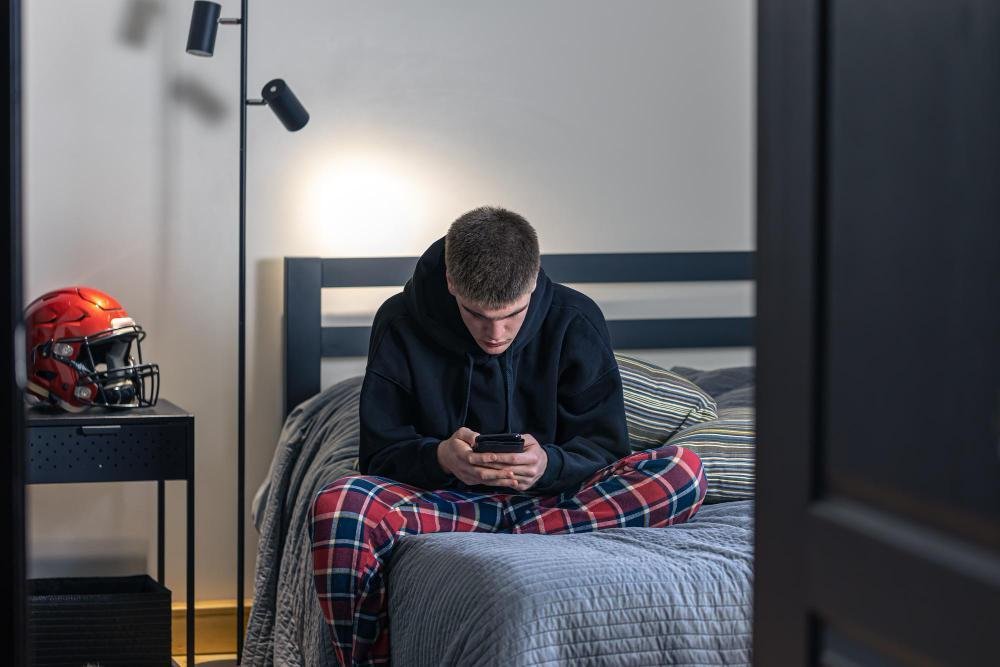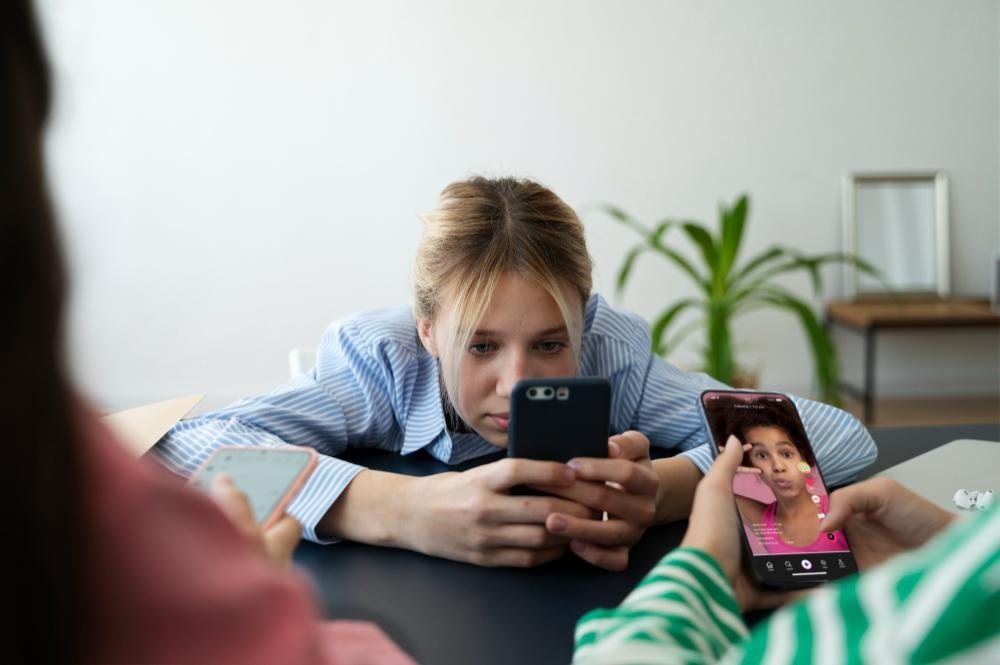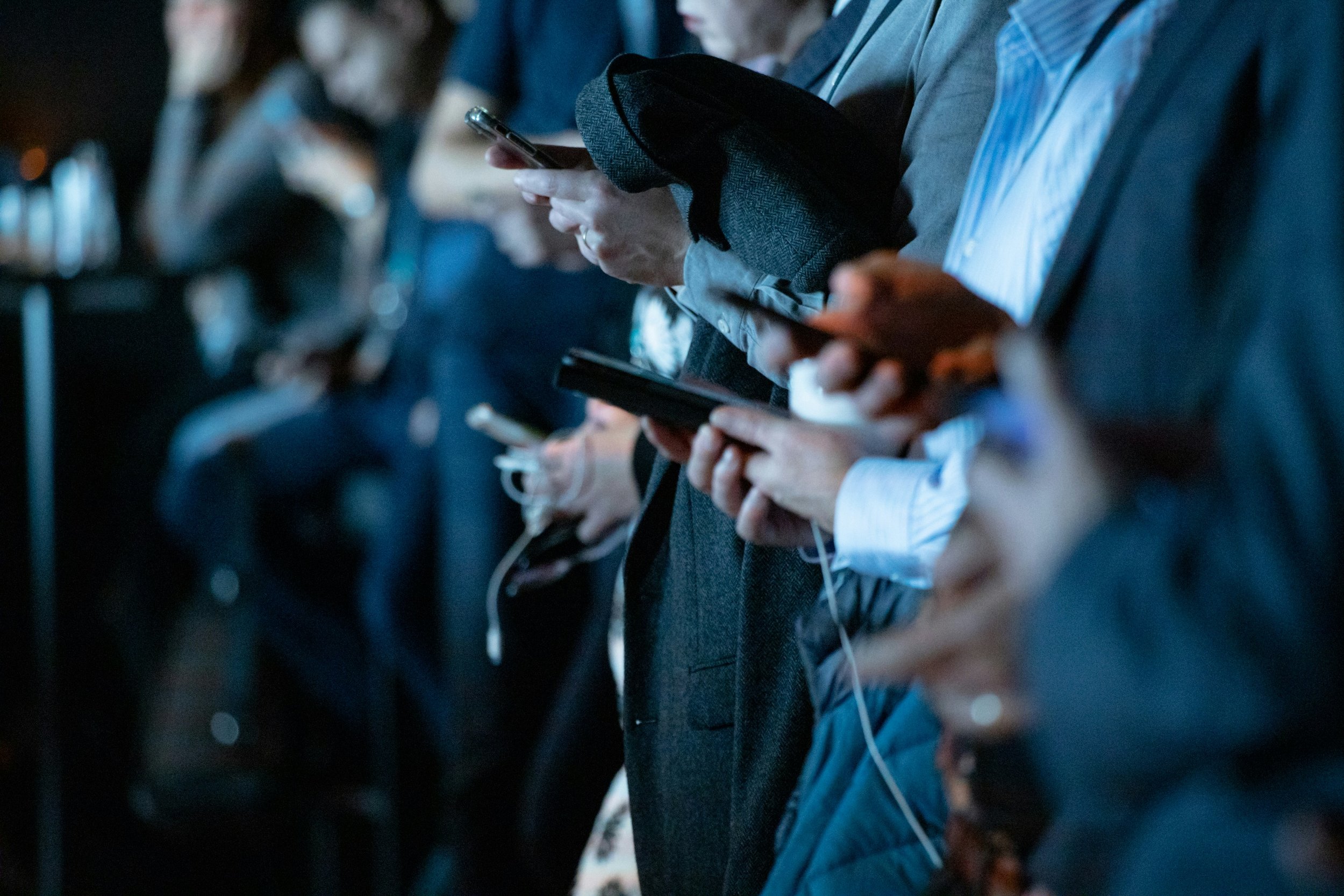Serving Florida
clients via Telehealth
Social Media Addiction Treatment in Fort Lauderdale
Breaking Free from Digital Overload - Rediscover Life Beyond Screens
Social media is one of the most powerful tools for communication and entertainment today. However, excessive use of social apps and platforms can escalate into an addiction. When this happens, it can have a major negative impact on the individual’s life, causing problems ranging from ruined relationships to low self-esteem.
At Serenity Space Therapy, we specialize in supporting individuals experiencing social media addiction symptoms, and empowering them with the tools and knowledge to regain control and live more purposefully.
You don’t need to suffer in silence—we’re here to help!
Social Media Addiction: Definition and Symptoms
Social media addiction isn’t excessive scrolling or frequent use of social media apps. It’s a complex compulsive behavior that harms an individual’s daily functioning and mental health. The good news is that there is hope, and we can help you.
The first step towards successful treatment is recognition. If you or a loved one exhibits any of these signs and unsure how to overcome social media addiction, consult us for free. We are here to support you on your healing journey.
● You have a compulsive need to refresh your apps and check your notifications.
● You struggle with anxiety, low self-esteem, or depression due to social media interactions.
● Your screen time prevents you from fulfilling your professional, personal, or social obligations.
● You experience unpleasant physical symptoms, such as poor sleep quality, eye strain, or headaches, due to the overuse of devices.
Causes of Social Media Addiction
Dependency on social media results from a combination of various factors, both psychological and environmental. Recognizing the underlying causes of social media addiction is a crucial step toward acknowledgement and finally breaking free from its chains.
● Social validation—Individuals with low self-esteem may use social media for external validation and approval.
● Instant gratification—The likes, comments, and shares trigger instant gratification by activating the brain’s reward system and encouraging continuous use.
● Distraction —Some people use social media to escape daily life struggles, providing short-term relief and long-term dependence.
● Escape from loneliness—Some individuals become addicted to social media as they begin to use it as a security blanket to cope with loneliness, awkwardness, or anxiety.
● Algorithms— Sophisticated technology promotes prolonged use by personalizing content to meet individual preferences, making it difficult to disconnect.
Social Media and Addiction Go Hand in Hand
Social media platforms are designed to make users addicted as higher engagement translates into higher revenue through advertisements. Many social media platforms employ the Fogg Behavioral Model to promote habitual use, a process very similar to addiction itself:
● Motivation: The anticipation of likes, comments, and shares followed by a fear of missing out.
● Action: Reading comments, viewing likes and shares, engaging in discussion.
● Trigger: The circumstance that activates the motivation, such as a phone notification.
Social Media Addiction: Its Effects on Your Well-Being
The effects of addiction to social media extend beyond prolonged screen time. It can wreak havoc on various aspects of an individual’s life and increase the risk of:
● Relationship issues
Overuse of social media can harm real-life relationships by replacing meaningful, face-to-face conversations with the virtual world.
● Mental health problems
Frequent social media use, couple with increased exposure to cyberbullying, comparison, and information overload, raises the risk of stress, anxiety, and depression.
● Physical strain
Poor posture, eye strain, and disrupted sleep patterns are common consequences of excessive screen use.
● Reduced productivity
Compulsive social media use diminishes focus, promotes procrastination, and decreases efficiency in personal life, school, or work.
● Emotional dependency
The constant need for validation through comments, shares, or likes fosters unhealthy reliance on external factors for self-worth.
Social Media Addiction vs. Traditional Addictions
Despite ongoing efforts to raise awareness about the reality of social media addiction, its status as a socially acceptable activity and a relatively recent type of addiction, makes it even more challenging to recognize and treat.
However, social media addiction is, in many ways, similar to well-known addictions such as substance abuse or gambling. Whether it’s substance abuse or social media addiction, individuals who are addicted tend to exhibit similar patterns of behavior:
● Compulsive behavior
People addicted to social media often struggle with an uncontrollable urge to check their social media platforms, despite experiencing negative effects.
● Withdrawal symptoms
Individuals addicted to social media commonly report discomfort or irritability when they can’t access their accounts or devices, similar to withdrawal symptoms seen in other addictions.
● Craving & reward
The dopamine release triggered by notifications, likes, and comments is similar to the instant gratification sought by individuals addicted to substances or gambling.
● Poor quality of life
Like traditional addictions, dependency on social media can damage relationships, cause mental and physical health issues, and decrease your overall quality of life.
At Serenity Space Therapy. we specialize in providing therapy for social media addiction, focusing on breaking the cycle and helping you restore control and balance.
You’re Ready to:
If you recognize any signs of social media addiction, the first step toward positive change is acknowledging the struggle. Contact us today, and we’ll help you:
● Regain control by learning how to set healthy boundaries and prioritize real-life relationships.
● Restore balance between online and offline commitments to protect and enhance your well-being.
● Build resilience and adopt effective coping strategies to manage triggers and maintain long-term digital wellness.
● Address inner challenges such as poor self-esteem, stress, anxiety, depression, or any other issues caused by excessive social media use.
● Develop healthy, fulfilling habits that foster genuine connections and bring joy and fulfillment into your life.
● Improve your mental well-being by uncovering and addressing the root causes of social media addiction.
Now is the best time to start—reclaim your life and discover peace and freedom beyond the screen.
Impact on Different Age Groups
Every age group is affected by social media addiction differently. This emphasizes the need for personalized therapy to ensure optimal outcomes. The effects of social media addiction vary depending on the age group, current life stage, and experiences:
● Teens
Teenagers are growing up in a highly digitalized world, which makes them particularly vulnerable. Overuse of social media negatively affects their social development negatively and contributes to anxiety, depression, cyberbullying, poor academic performance, self-harm, and even suicidal thoughts.
● Young adults
Young adults often feel pressured to present an idealized version of their lives online, which can increase their risk of anxiety and depression. This pressure can contribute to low self-esteem and feelings of inadequacy due to constant comparisons.
● Adults
Unfortunately, many adults are at a high risk of social media addiction because they use online platforms to cope with anxiety, stress, or loneliness.
● Seniors
Elderly individuals may turn to social media to combat loneliness, which can lead to even greater isolation from their physical environment.
How to Stop Social Media Addiction
From your current stance, particularly if you’ve had unsuccessful attempts to break free from social media overuse, it may feel like everything seems hopeless. However, we assure you there’s hope, and we’re here to help!
We are trained professionals specializing in providing tailored therapy for social media addiction, which includes intentional steps to support you on the road to regaining control and restoring harmony. Overcoming social media addiction requires time and dedication, but with our expertise and support, you can reclaim your health, time, and well-being.
Here are the most effective approaches to overcoming social media addiction:
● Seek professional assistance at Serenity Space Therapy
As experienced and licensed therapists and counselors, we’re trained to help pinpoint triggers, address underlying causes, and promote effective coping tools to live an addiction-free, fulfilled life.
● Try a digital detox
Take regular breaks from all digital devices. This will reduce your dependency and give you time to clear your mind and focus on what matters.
● Set boundaries
Boundaries for social media use are vital. They help you limit the hours spent scrolling and checking apps. Time is precious, so use it wisely.
● Leverage technology
Use tools such as screen time trackers and app usage monitors to remain mindful of your social media habits.
● Choose healthier habits
Replace social media scrolling with hobbies like exercise, reading, walking, painting, or running, and prioritize in-person activities.
● Reconnect with real world
Put your family, friends, and nature first. Prioritize spending time outdoors, surrounded by loved ones, and nourish your reconnection with your offline life.
Role of Technology and Social Media Platforms
Technology and social media platforms are designed to be captivating which can make them addictive. Although their primary goal is to enhance user experience, this often leads unbalanced usage. Here is how social media platforms and technological devices promote addiction:
● They use sophisticated algorithms to enhance personalized content and prolong use.
● Social media features such as shares, comments, and likes promote instant gratification and reinforce repetitive use among individuals seeking external validation.
● They send constant notifications that encourage users to frequently check their apps, increasing dependency and reducing focus.
● Social media platforms promote engagement through highly addictive, convenient features such as autoplay of videos, infinite scrolling, and personalized recommendations.
Rely on our experienced team of therapists who specialize in therapy and counseling for social media addiction to help you identify the emotional and psychological factors leading to your addiction and provide effective coping tools!
Case Studies on Social Media Addiction
Every age group is affected by social media addiction differently. This emphasizes the need for personalized therapy to ensure optimal outcomes. The effects of social media addiction vary depending on the age group, current life stage, and experiences:
● Teens
Teenagers are growing up in a highly digitalized world, which makes them particularly vulnerable. Overuse of social media negatively affects their social development negatively and contributes to anxiety, depression, cyberbullying, poor academic performance, self-harm, and even suicidal thoughts.
● Young adults
Young adults often feel pressured to present an idealized version of their lives online, which can increase their risk of anxiety and depression. This pressure can contribute to low self-esteem and feelings of inadequacy due to constant comparisons.
● Adults
Unfortunately, many adults are at a high risk of social media addiction because they use online platforms to cope with anxiety, stress, or loneliness.
● Seniors
Elderly individuals may turn to social media to combat loneliness, which can lead to even greater isolation from their physical environment.
Future Trends in Social Media Addiction:
Advanced Interventions and Mental Health Support
As the prevalence of dependency on social media continues to rise, so does the need for advanced solutions to social media addiction and adequate mental support. Let’s explore future trends that play a major role in preventing and treating social media addiction:
● Digital Detox
Digital detox programs, which are gaining popularity, encourage individuals to take a break from social media and technology to improve their mental health.
Detox programs promote easier recovery from addiction by promoting self-reflection and by encouraging the adoption of healthier habits without the use of phones, laptops, and other screens.
● Therapy at Serenity Space Therapy
A variety of science-based therapeutical methods, such as CBT, available at Serenity Space Therapy, are highly effective methods for individuals seeking support for social media addiction.
We will work together to unravel the psychological roots of your social media addiction and help you build resilience against the lure of instant gratification, the need for external validation, and insecurities.
● Worldwide education
Prevention and early intervention are crucial in reducing the risk of long-term addiction. Schools and communities worldwide should take proactive steps to educate youth about the risks associated with excessive social media overuse.
These programs offer insights into digital literacy, emotional regulation, and mental health awareness, equipping teens with the skills to use social media responsibly.
● AI tools
Artificial intelligence plays a significant role in tracking and managing screen time. Many apps today provide insights into social media habits, helping individuals manage their social media usage and maintain boundaries.
These apps are expected to become even more sophisticated—they can be trained to spot early signs of social media addiction and encourage individuals to seek timely help.
FAQs
-
To overcome social media addiction, it’s essential to limit usage with tracking apps, engage in offline hobbies and activities, and seek professional help if necessary.
Serenity Space Therapy provides personalized support for social media addiction recovery, employing science-based modalities like CBT and holistic therapies such as mindfulness and digital detox plans to help you develop healthier habits and live more harmoniously.
-
It’s a behavioral addiction characterized by an obsessive concern with social media, driven by an uncontrollable urge to prioritize social media platforms above other activities.
Individuals who’re dependent on social media often dedicate significant time and effort to their online presence, leading to issues with their mental health, relationships, self-esteem, and more.
-
The underlying causes of social medial addiction range from psychological factors like anxiety, low self-esteem, and loneliness to algorithms designed to stimulate dopamine release through instant gratification and compulsive use. The impact of social media addiction is complex, may not be easily detectable, and requires a comprehensive therapeutical approach, like the therapy services available at Serenity Space Therapy.
-
Social media use can be addictive because it triggers the brain’s reward system and stimulates dopamine release. This leads to a vicious cycle of validation and gratification through comments, shares, likes, and other features designed to maintain high engagement.
-
Numerous studies have linked social media addiction to an increased risk of anxiety, depression, self-harm, loneliness, cyberbullying, and even suicidal thoughts. Overuse of social media fosters negative experiences and can have a destructive effect on the individual’s physical, mental, and emotional health.
You’re ready to:
Regulate the Impact of Social Media on Personal Life
Harmonize Real-Life Commitments with Social Media Use
Establish Firm Digital Boundaries
Cultivate Balanced Online and Offline Lifestyles
Recognize and Tackle Social Media-Induced Challenges
Enhance Emotional Well-Being Offline

Impact on Different
Age Groups
Social media addiction affects various age groups differently. Growing up in a digital world, teenagers are particularly susceptible, as social media use is intertwined with their social development. Young adults often face pressure to present a perfect life online, leading to anxiety and self-esteem issues. Older adults might turn to social media for connection, risking isolation from their immediate physical environment. While it is common for these people to turn to the internet, admitting “I'm addicted to social media,” is the first step in seeking professional help.
Strategies for Management and Recovery
Managing and overcoming social media addiction involves several strategies:
Digital Detox: Periodically disconnecting from digital devices can provide mental clarity and reduce dependency.
Setting Boundaries: Limit social media use by setting specific times for checking apps.
Professional Help: Therapy can provide personalized strategies and support, especially with professionals like Roman Lockshin from Serenity Space Therapy.
Replacing Social Media Use: Engaging in hobbies, physical activities, or face-to-face interactions can fill the void left by reduced social media use.
Role of Technology and Social Media Platforms
Case Studies
and Personal Stories
The journey through social media addiction is vividly illustrated through real-life case studies and personal narratives. These stories not only provide valuable insights into the complexities of the addiction but also highlight the crucial role of therapy and support systems in recovery. Many of these stories emphasize the effectiveness of e-counseling services in Fort Lauderdale and Naples, illustrating how professional guidance can make a noticeable difference in managing this modern challenge.
The intricate design of social media platforms, with their sophisticated algorithms and persistent notifications, plays a significant role in fostering addictive behaviors. These platforms are engineered to maximize user engagement, often at the cost of users' mental health. In response to growing concerns, there's an increasing demand for these platforms to integrate features that encourage healthier usage patterns. This includes the implementation of screen time limits and usage reminders, essential tools in the realm of online therapy services and virtual counseling.
Future Trends and Research
As we delve deeper into the realm of social media addiction, ongoing research is constantly unveiling new methods to understand and combat this issue. Anticipated future trends include more advanced technological interventions, such as sophisticated app time limits, and a societal shift in the perception and usage of social media. This growing awareness is a promising step towards developing more effective strategies for treating or preventing social media addiction, particularly in the field of mental health support online in Fort Lauderdale and Naples.
Resources and Support Systems
Struggling with social media addiction can feel isolating, but you're not alone. Consider exploring social media addiction therapy at Serenity Space Therapy along with its various therapy options, including online therapy services. These services offer personalized approaches to managing addiction symptoms and fostering healthier interactions with technology. The convenience and accessibility of virtual counseling and e-counseling services in Fort Lauderdale and Naples mean that help is readily available for those in need.
Social media addiction is indeed a complex challenge, but with the right combination of strategies, support, and resources, overcoming it is within reach. If you find yourself relating to the symptoms and impacts described, we invite you to reach out to our therapist, Roman Lockshin, at Serenity Space Therapy. Roman's expertise in this area can provide you with the guidance and support necessary for a journey towards recovery and balance. Please keep in mind that taking the first step toward seeking help is a sign of strength, not weakness.
Together let's open up your life to the peace and joy you deserve.
Questions about online counseling in Florida? Visit my FAQs page.













